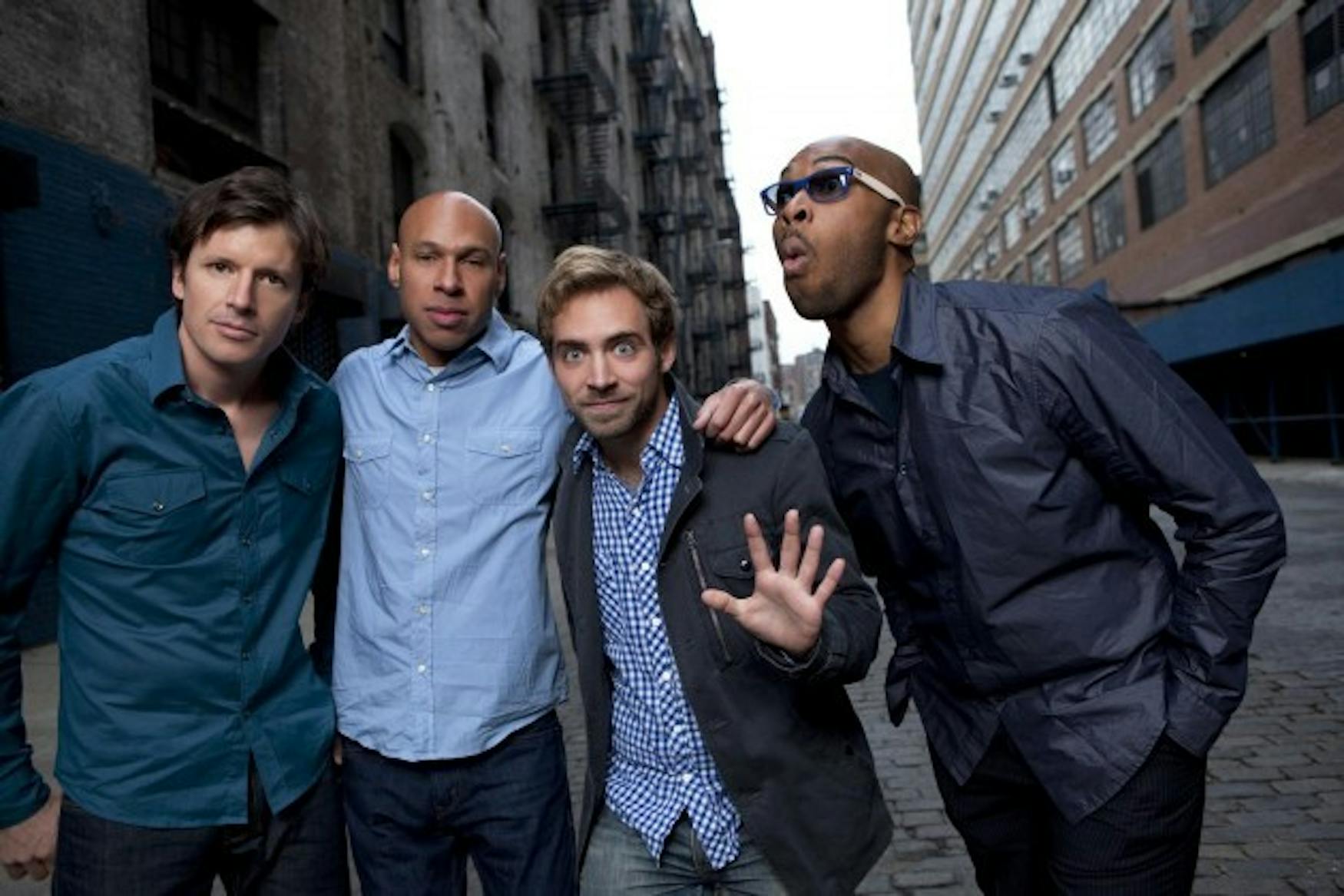Greater than the sum of its parts, James Farm rocks the BPC
Historically, great jazz groups have come in the form of quartets and quintets led by a highly influential composer and performer. Master bandleaders such as Miles Davis, John Coltrane and Art Blakey stood at the forefront of their music and gave each song their own sound. While each member was essential and individual, they were labeled as "sidemen"—the people who played in the leader's group.
Not so with James Farm, the acoustic jazz collective consisting of tenor saxophonist Joshua Redman, pianist Aaron Parks, bassist Matt Penman and drummer Eric Harland. And while each is a leader in his own right, this quartet has achieved an elusive result in jazz with its eponymous 2011 album—a collective band identity.
"From the beginning, we've viewed the band as a collaborative project ,and we've kept it that way," says Redman a few days before a set at the Berklee Performance Center last Friday. "We wanted to organize our music as a band, not as a leader and some sidemen."
Formed in 2009, James Farm made its first big splash at the Monterey Jazz Festival and has been credited to hold a stake in the future of jazz. But these are not newcomers to jazz by any means. Redman, Harland and Penman played together in the SFJAZZ Collective from 2005 to 2007, and Parks has shared albums with the other James Farm members.
Put the first letters of each member's first names together and you get "JAME." Where the "S FARM" comes from, no one knows. While the origins of James Farm's name remains a mystery, the group once attributed it to "too many drunken emails."
Redman, son of saxophonist Dewey Redman, has been a prominent player in jazz for over a decade and dedicates much of his time to big-name collaborations such as a duo tour with Brad Mehldau this fall. The tenor saxophonist—who turned down his acceptance into Yale University Law School after graduating from Harvard in order to become a full-time musician in 1991—has recorded with Pat Metheny, Christian McBride and Aaron Goldberg and played with the Bad Plus and even progressive-rock jam band Umphrey's McGee.
Parks, the youngest of the group, has played with trumpeter Terrence Blanchard since the early 2000s.
Meanwhile, Penman, a native of New Zealand who moved to the U.S. in 1994, performs regularly with John Scofield, Mark Turner and Kurt Rosenwinkel. Both Penman and Harland, an influential bandleader and drummer in his own right, are current members of the SFJAZZ Collective.
James Farm strays from the old jazz formula of melody and improvisation, focusing instead on developing narratives through song. Gone are the solos that seem to last forever. Here, the changes lie in the form, in how each composition is structured. For example, in Parks' "Chronos," a dark, minor piano theme gives way to unexpected transformations. A melody begins to build off of the piano riff, yet just as Redman's solos and Harland's grooves heat up the song, everything slows down for an otherworldly new section.
"There's definitely more of a big-picture approach here," says Redman.
The big picture turns out to be a more open and free-form type of chamber jazz, a breath of fresh air for a scene littered with people who play too fast. Not that the members of James Farm sometimes don't stretch their virtuosic muscles—Harland's "I-90" begins with one of the fiercest grooves in recent memory, bearing influences of electronica. Redman's solo in "Coax" spans the range of his instrument in seconds. But they know when to stop showing off and start playing songs.
James Farm began its fiery performance at the Berklee Performance Center with a driving, groove-based "1981" that morphed seamlessly into Redman's "If By Air" via a quiet interlude. It was a beautiful moment when all that could be heard was Redman's low, hissing notes. The tenor saxophonist demonstrated an unmatched maturity with his soft, breathy tone. But the subdued atmosphere doesn't last for long—like any live jazz performer, Redman soon had the crowd going wild over his solos.
Redman's "Polliwog" was noticeably faster live than in the album, with Harland imbuing the song with a blues-rock flavor not found in the recording. But to Redman, variation is what jazz is all about.
"We try to honor and preserve the emotional core of the song, and yet remain spontaneous," he says. "I think that's one of the balancing acts of the band, and maybe one of our strengths, too—the ability to serve the song and also honor the moment by pure improvisation."



Please note All comments are eligible for publication in The Justice.